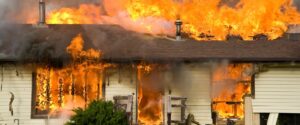If you’re dealing with the aftermath of a house fire, one question likely weighs heavily on your mind: is it safe to live in a house that had a fire? While staying in the home might seem like the cheaper or more convenient option, the decision carries serious implications for your safety, health, and even future home value.

This guide will walk you through key considerations when living in a house after a fire, offer tips for safe restoration, and help you decide whether to stay or sell.
Structural Safety: Is It Safe to Live in a House That Had a Fire?
Determining Structural Integrity
The most important concern when living in a house after a fire is whether the structure remains sound. Fire can weaken walls, floors, and ceilings—even in areas untouched by flames. Water from firefighting efforts can further compromise materials.
Before moving back in, hire a licensed contractor or structural engineer to inspect the property. Their assessment will determine whether it’s safe to enter or live in the space and what repairs are needed to stabilize the home.
Health Concerns When Living in a House After a Fire
The risks of living in a house after a fire go beyond structural damage. Even after the flames are out, soot and smoke residues can linger in the air, HVAC systems, walls, and furniture—posing serious respiratory and skin irritations. Exposure may worsen asthma, cause allergies, or even result in long-term illness.
Additionally, moisture from firefighting can lead to mold growth, another threat to indoor air quality. If you’re asking is it safe to live in a house that had a fire, the answer depends heavily on whether professional cleanup and air quality testing have been completed.
Repairs and the Role of Insurance
There are several ways to find a solution for a fire-damaged house such as cleaning the surfaces, replacing the items or restoring basic utilities. So, can you live in a house with fire damage while these repairs are underway?
It depends on how much damage has occurred. For instance, if the fire affects your heating system or plumbing, it may not be safe or comfortable for you to stay in the house during repairs.
Fire damage will likely be covered by homeowners’ insurance policy. Many policies may extend to living expenses while the home is uninhabitable, too. Capture photographs of the damage. Have written evaluations from professionals. Make sure to call and keep up close with the insurance company. If you’re planning to sell the home after repairs total transparency with the buyer would be important in knowing what really happened with the fire damage. Buyers find sellers with proof of completed repairs and professional inspections more reliable to purchase from.
Emotional and Financial Factors of Living in a House After a Fire
Beyond physical damage, house fires are deeply emotional experiences. Living in a house after a fire may bring back painful memories or stress, especially if you’ve lost meaningful belongings. Your home may no longer feel like a refuge.
From a financial perspective, deciding whether to stay in the home is a trade-off between the cost of repairs and the cost of temporary housing. Ask contractors for actual estimates of repairs and compare those costs with your budget and insurance coverage to set your best course.
Devastating wildfires in Los Angeles have shown how destructive fires are to property and even to lives. For those asking can you live in a house with fire damage after such disasters, the answer depends on several factors such as the extent of the damage, the resources available for repairs, and your ability to emotionally and financially handle the recovery process.
Selling a Home After Fire Damage: Is It the Right Move?
If you choose to sell the home instead of staying, focus on making it marketable through repairs, transparency, and safety upgrades. Buyers, especially in fire-prone regions like Los Angeles, are often willing to invest in a home with a solid history of repairs and safety precautions.
Ultimately, whether or not you can live in a house with fire damage depends on your specific circumstances, priorities, and resources. No matter which path you choose, prioritize the safety and well-being of your family while keeping your long-term goals in mind.